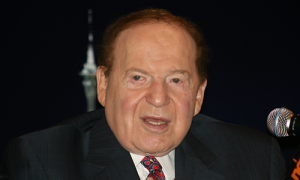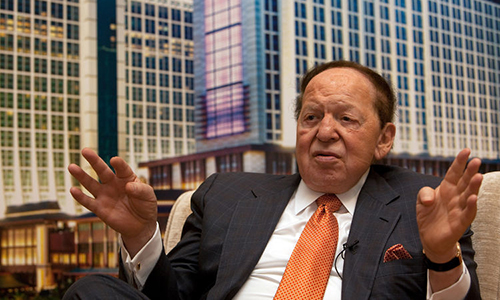WSJ Report: Sheldon Adelson Influenced New Wire Act Opinion
There are different types of surprises in this world. The surprise a child rejoices in when a puppy pops out of a box on Christmas, that’s tears of joy from something they didn’t see coming at all. The surprise a child gets when a classmate tells him that his parents are Santa Claus, that’s a my-entire-worldview-has-changed surprise. When your best friend is keeping you away from your house for an unusual amount of time on your birthday, that surprise party was really no surprise at all, though it was appreciated. And the news that The Wall Street Journal broke on Friday, revealing that billionaire Republican donor and Las Vegas Sands CEO Sheldon Adelson was the major force behind the Justice Department’s re-re-interpretation of the Wire Act, was the kind of surprise that only would have been surprising if it weren’t true.
 The new opinion from the Justice Department’s Office of Legal Counsel (OLC) seemed odd, not just because of its content, but because it even came to be in the first place. I mean, why? Why did the Justice Department find online gambling to be so important that it not only needed to review a seven-year old opinion of a 57-year old law, but that it also deemed it necessary to reverse the 2011 opinion on such a thin interpretation? I haven’t noticed anyone giving much of a shit about online poker or online gambling on Capitol Hill for years. That was part of the difficulty of getting online poker legalized on the federal level in the days of Barney – nobody cared enough to deal with it.
The new opinion from the Justice Department’s Office of Legal Counsel (OLC) seemed odd, not just because of its content, but because it even came to be in the first place. I mean, why? Why did the Justice Department find online gambling to be so important that it not only needed to review a seven-year old opinion of a 57-year old law, but that it also deemed it necessary to reverse the 2011 opinion on such a thin interpretation? I haven’t noticed anyone giving much of a shit about online poker or online gambling on Capitol Hill for years. That was part of the difficulty of getting online poker legalized on the federal level in the days of Barney – nobody cared enough to deal with it.
Oh wait, there have been a couple people who have cared about online gambling: current Senator Lindsey Graham and former Representative Jason Chaffetz, both of whom introduced Sheldon Adelson’s Restoration of America’s Wire Act (RAWA). Graham continued with his hard-on for (against) online poker when he brought up the 2011 OLC opinion at former Attorney General Jeff Sessions’ confirmation hearing.
Adelson’s People Gave Input to Justice Department
So yeah, there have been people still interested in banning online gambling and those people have been motivated by Adelson. Thus, when the WSJ reported that the new OLC’s opinion, that the Wire Act bans all online gambling “hewed closely to arguments made by lobbyists for casino magnate and top Republican donor Sheldon Adelson,” it was not shocking in the least.
The WSJ article laid out the process:
In April 2017, one of the lobbyists sent a memo to top officials in the Justice Department, arguing that a 2011 opinion that benefited online gambling was wrong.
Officials in the department’s Criminal Division, in turn, forwarded it to the Office of Legal Counsel, which had issued the opinion, and asked attorneys there to re-examine their stance that a law on the books for decades didn’t prohibit online gambling, according to documents and interviews with people familiar with the matter.
The Wall Street Journal wrote that the Justice Department denied any “outside pressure to produce a specific conclusion,” but considering what the WSJ found out, that seems like bullshit, especially considering the Trump administration covets Adelson sweet, sweet donations.
“Earlier this week, the Justice Department said neither Mr. Adelson nor any outside parties were consulted on its recent decision,” the WSJ article states. “But department officials said that they were in possession of the legal analysis from Mr. Adelson’s team after being asked about it by The Wall Street Journal.”
Wire Act Tug-of-War
The Wire Act was passed in 1961 as an effort to curb organized crime in the U.S., specifically outlawing sports betting over a “wire communication facility.” Here is what the Wire Act looks like:
Whoever being engaged in the business of betting or wagering knowingly uses a wire communication facility for the transmission in interstate or foreign commerce of bets or wagers or information assisting in the placing of bets or wagers on any sporting event or contest, or for the transmission of a wire communication which entitles the recipient to receive money or credit as a result of bets or wagers, or for information assisting in the placing of bets or wagers, shall be fined under this title or imprisoned not more than two years, or both.
When online gambling began to get popular, the Justice Department interpreted the Wire Act as applying to all online gambling, not just sports betting. In response to a question by the lottery commissions of Illinois and New York, who wanted to sell lottery tickets over the internet, the OLC published an opinion in late 2011 which said the Wire Act did, in fact, only apply to sports betting.
And how we have this new OLC opinion which goes back to the old interpretation that the Wire Act bans all online gambling. The opinion is weird, in that it combs over every comma, every space between words, to arrive at a conclusion that only makes sense if you are actively looking to make that conclusion:
Only the second prohibition of the first clause of section 1084(a), which criminalizes transmitting “information assisting in the placing of bets or wagers on any sporting event or contest,” is so limited. The other prohibitions apply to non-sports-related betting or wagering that satisfy the other elements of section 1084(a).
The 2006 enactment of the Unlawful Internet Gambling Enforcement Act did not alter the scope of section 1084(a).
But there it is. Whether or not it will actually mean anything to the future of online gambling in the United States remains to be seen. We do know, though, that Sheldon Adelson’s gnarled fingers are all over the OLC opinion, but what else did we expect?



















COMMENTS